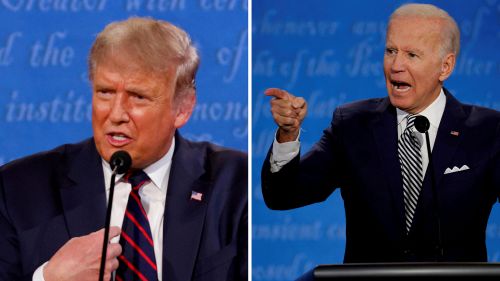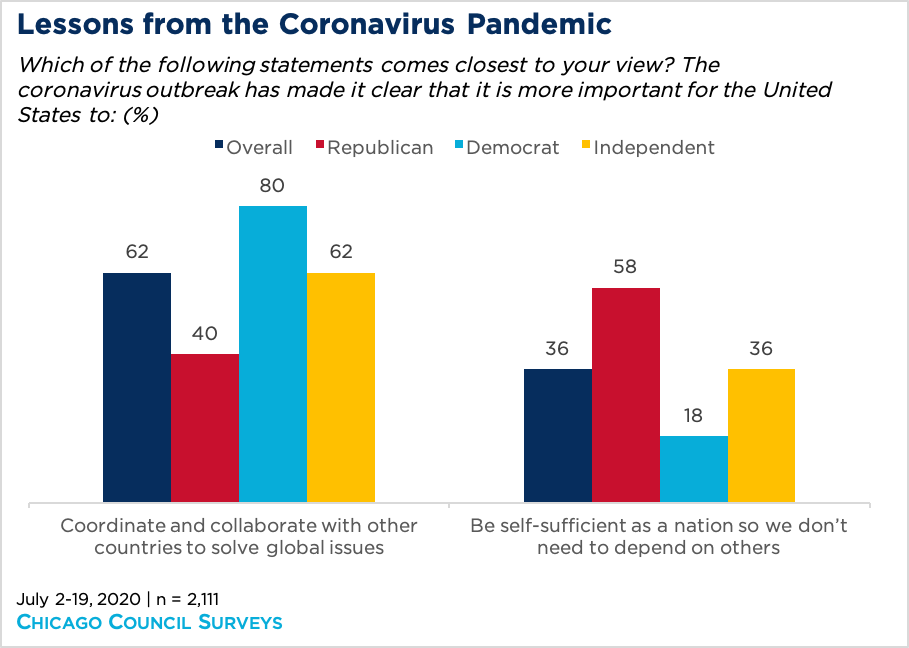Americans' Views on Key Debate Issues: COVID-19, Race, Election Interference, Economy

Dina Smeltz shares public opinion on the key topics that will be discussed at the first 2020 presidential debate.
Introduction
The first presidential debate, scheduled for September 29, will feature 15-minute segments on several topics that include the COVID-19 pandemic, race and violence in cities, election integrity and the economy.
The just-released 2020 Chicago Council Survey report, “Divided We Stand,” includes a discussion of American public attitudes on many of these topics. We’ve pulled out some highlights for you in advance of the first debate.
Coronavirus
More Americans name the coronavirus pandemic (67%) a critical threat than any other presented in the 2020 Chicago Council Survey, and it is the leading threat among both Democrats (87%) and Independents (60%). But only 48 percent of Republicans consider the virus a critical threat, making it 9th out of 15 potential items (the development of China as a world power is the top threat for Republicans at 67%).
Republicans may be less likely to rate the pandemic a critical threat because they think the US government is dealing with it effectively (63%). By contrast, a majority of Democrats (66%) and Independents (55%) say the government response has been ineffective. In other words, Republicans tend to believe that President Trump is on the case, while others think he’s been asleep at the wheel.
Republicans and Democrats have also drawn different lessons from the outbreak. Eight in ten Democrats (80%) say that the coronavirus outbreak has made it clear that it is more important for the United States to coordinate and collaborate with other countries to solve global issues. Six in ten Republicans (58%) have drawn a different lesson, saying it has made it clear that the United States should be self-sufficient as a nation so we don’t need to depend on others.

Race and violence in cities
Just over half of Americans say that racial inequality is a critical threat (51%), and it is a more pressing concern for Democrats (73%) than for Independents (51%) and Republicans (23%). Non-white Americans are also more likely to say racial inequality is a critical threat than white Americans (66% versus 42%).
As with the handling of COVID-19, Democrats and Independents say the government management of racial inequality has been ineffective (81% Democrats, 63% Independents), while a plurality of Republicans say it has been effective (49%).
In light of the recent protests, looting, and unrest over the summer in cities like Portland, Minneapolis, New York City, and Chicago, Republicans also favor using US troops to suppress protests (59%) and to suppress riots, looting, and vandalism in the United States (83%). Overall, just 36 percent of Americans favor using force to quell protests (17% Democrats, 35% Independents) and 58 percent favor using force to suppress riots, looting, and vandalism (38% Democrats, 57% Independence).
Election integrity
A majority of Americans say that foreign interference in American elections is a critical threat, and interference is a top threat for Democrats (69%). The issue is less of a concern for Independents (49%) and Republicans (41%). Most Democrats (71%) and Independents (55%) think the government response to election interference has been ineffective (71%); even among Republicans, only a narrow majority (52%) think the US response has been effective. A January 2020 NPR/PBS NewsHour/Marist poll also showed a high level of concern about election security among American voters, including 51 percent who said that President Trump had encouraged election interference.
Economy
A majority of Americans consider a global economic downturn a critical threat (55%), and it is viewed as such across party lines. Nearly six in ten Republicans (56%) believe the US government is addressing this threat effectively, though few Democrats (24%) or Independents (36%) agree.
Economic inequality is only seen as a critical threat by Democrats (67%, compared to 24% of Republicans and 38% of Independents). Across party lines, however, no more than half think the government is handling the problem effectively (49% Republicans, 15% Democrats, 31% Independents).

